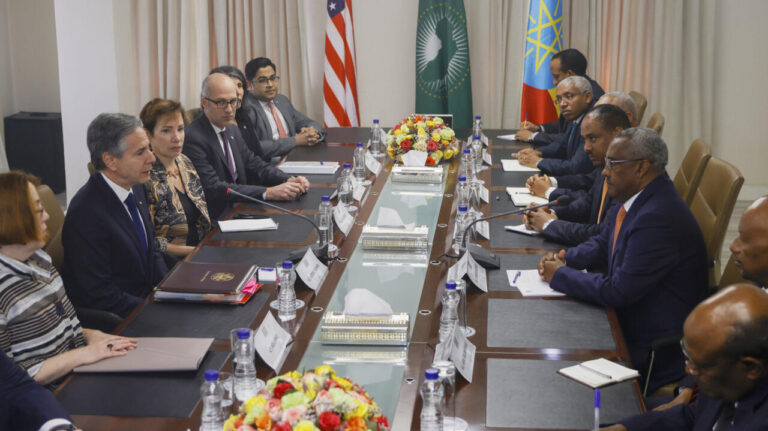Issued on:
US Secretary of State Antony Blinken on Wednesday urged Ethiopia to “deepen the peace” in its war-torn north, as he announced a $331-million aid package to the country during a visit aimed at repairing relations shaken by the two-year conflict.
The top US diplomat was paying his first visit to the longstanding ally since the end of the war in Tigray, which claimed 500,000 lives according to US estimates, and led Washington to sever trade preferences with Africa’s second most populous nation.
As China and Russia increasingly seek influence in Ethiopia and around the continent, Blinken opened his visit by voicing hope for better relations as he sipped Ethiopia’s celebrated coffee at the foreign ministry.
“It is a very important moment, a moment of hope, given the peace in the north that has taken hold,” Blinken said.
“There is a lot to be done. Probably the most important thing is to deepen the peace that has taken hold in the north.”
Blinken, who alleged crimes against humanity were committed during the war, said his goal was “strengthening the relationship” with Ethiopia, home of the African Union, as US President Joe Biden pushes for closer relations with African nations.
Blinken later met with Prime Minister Abiy Ahmed, who wrote on Twitter that the two “agreed to strengthen the longstanding bilateral relations (between) our countries with a commitment to partnership” during talks that were closed to the press.
Today I have met with @SecBlinken Anthony J. Blinken, where we held in-depth discussions on various domestic, bilateral & regional issues of mutual interest. We have agreed to strengthen the long standing bilateral relations b/n our countries with a commitment to partnership. pic.twitter.com/L7r8ElNmuC
— Abiy Ahmed Ali 🇪🇹 (@AbiyAhmedAli) March 15, 2023
‘Life-saving support’
Later in the day, Blinken announced fresh humanitarian assistance worth more than $331 million to Ethiopia, which is also grappling with a record drought in its southern and southeastern regions.
“This funding will provide life-saving support to those displaced and affected by conflict, drought, and food insecurity in Ethiopia,” Blinken said as he toured a UN logistics hub in Addis Ababa for food relief.
The new aid, which brings total US humanitarian assistance to Ethiopia to more than $780 million in the US fiscal year 2023, is intended “for everyone — not one group or region”, Blinken told reporters.
“We want to make sure whoever is in need gets that assistance.”
Blinken walked past packed split peas and vegetable oil donated by the United States and, pointedly, wheat gifted by Ukraine, the invaded nation’s flag emblazoned on the sacks, as Washington presses Russia to renew a grain export deal.
Calls for accountability
Abiy, a Nobel Peace Prize winner, was once seen as at the vanguard of a new generation of forward-looking African leaders, but his reputation took a beating in Washington over the Tigray war.
The violence erupted when the Tigray People’s Liberation Front (TPLF), which once dominated Ethiopian politics, attacked military installations, prompting a major offensive by Abiy’s government with backing from neighbouring Eritrea.
The TPLF came close to marching on the capital but, beaten back by pro-Abiy forces, agreed to disarm under a November 2 accord negotiated in South Africa by the African Union with US participation.
A key goal of Ethiopia is a return to the African Growth and Opportunity Act, US legislation that gave it duty-free access for most products to the world’s largest economy, but Washington has made no commitments.
Abiy has pledged to restore basic services in war-wracked Tigray, though it is impossible to assess the situation on the ground due to restrictions on media access.
Human Rights Watch and Amnesty International have both urged Blinken to press for full implementation of the peace deal and accountability for past abuses.
“Failure to do so will send a signal to perpetrators everywhere that the US will not stand up for justice,” Amnesty’s Africa advocacy director Kate Hixon said.
The Tigray war has been one of the deadliest in the 21st century, with a US-estimated toll higher than that from Russia’s invasion of Ukraine, which has drawn far more global attention.
Moscow has gone on a diplomatic offensive in Africa, including in Ethiopia, hoping the continent will stay neutral rather than join Western sanctions against it.
Russia’s efforts follow years of inroads in Africa by China, which has also offered the continent’s leaders relationships unencumbered by Western pressure on human rights.
(AFP)



